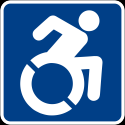 The Americans with Disabilities Act, commonly known as the ADA, is considered one of the most important pieces of civil rights legislation for people with disabilities. Passed in 1990 and amended in 2008, the ADA attempts to provide equal opportunities for people with disabilities in all facets of public life.
The Americans with Disabilities Act, commonly known as the ADA, is considered one of the most important pieces of civil rights legislation for people with disabilities. Passed in 1990 and amended in 2008, the ADA attempts to provide equal opportunities for people with disabilities in all facets of public life.
The ADA is divided into several sections. Title I requires employers with at least 15 employees to provide people with disabilities with reasonable accommodations for their disabilities, and it prevents employers from discriminating against people with disabilities during the hiring and promotional processes.
Title II of the ADA mandates that state and local governments provide equal opportunities for people with disabilities in all state programs, including education, health care and social services. This portion of the ADA is frequently used to force states to provide equal access to health insurance, like Medicaid, and other means-tested state programs. Title II also calls for accessible public transportation and sets standards for new accessible public transportation vehicles.
Title III prevents exclusion and discrimination in public accommodations like stores, restaurants and hotels. This portion of the ADA also applies to private corporations that provide transportation services, like airlines and bus companies. The regulations implementing this section of the ADA go into great detail about how buildings should be designed or retrofitted to allow access for people with disabilities.
Finally, Title IV requires phone companies and broadcasters to provide closed captioning and telephone relay services, which allow persons with hearing or speech disabilities to place and receive telephone calls.
Since its passage, the ADA has provided people with disabilities with an avenue to challenge discriminatory treatment throughout society and it has been incredibly successful. In 2008, the ADA was amended to clarify just who is considered “disabled” under the Act, broadening the category of people eligible for protection.
People with special needs have used the ADA to challenge a variety of state laws and regulations that have targeted disability benefits and other programs for people with special needs, and the law has made most public buildings and vehicles much more accessible, so even if you never have to file a complaint under the ADA, you probably benefit from it in a variety of ways.
To learn more about the ADA, visit the Department of Justice’s ADA information center here.
